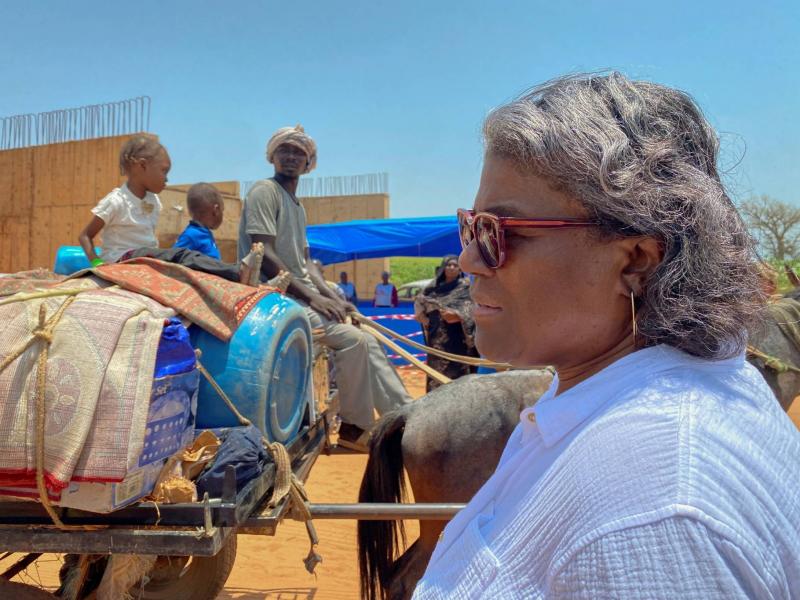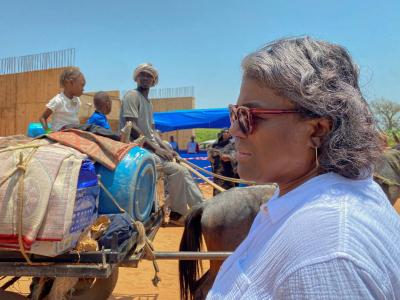On Wednesday, U.S. Ambassador to the United Nations Linda Thomas-Greenfield met with Sudanese refugees fleeing ethnic and sexual violence and stated that the United States "will do everything possible to prevent and address mass atrocities" in the Sudan war. During her visit to the town of Adré in Chad, near the Sudan border, Thomas-Greenfield announced new sanctions targeting Abdel Rahim Daqlo, the brother of Rapid Support Forces leader Mohamed Hamdan Daqlo, known as Hemeti, due to human rights violations.
The U.S. envoy met with about seven Sudanese women in Adré who shared their experiences of fleeing extreme violence. Thomas-Greenfield told Reuters, "All of them came to Chad fearing what could happen to them. None of them expressed any desire or inclination to return home as long as violence continues." She continued, "I felt despair because I felt powerless to do anything for them. I could not provide an answer about how the international community could help them."
Thomas-Greenfield visited a temporary hospital run by Médecins Sans Frontières, which is treating about 144 patients, most of whom suffer from malnutrition. While passing through one part of the hospital, a woman was slowly feeding a malnourished child, and another sick child was lying alone in a neighboring bed. Before arriving in Chad, Thomas-Greenfield stated, "We have undoubtedly reached a level of serious atrocities that reminds us strongly of what we witnessed in 2004, which led us to describe it as genocide."
She added, "We hear about women subjected to brutal gang rapes repeatedly and villages being raided, and there are images showing mass graves. The evidence is there." In the early 2000s, the United Nations estimated that around 300,000 people were killed in Darfur when the Janjaweed militia, which later formed the Rapid Support Forces, helped the army crush a rebellion primarily led by non-Arab groups. There are Sudanese leaders wanted by the International Criminal Court for charges of genocide and crimes against humanity.
"Appalling Situation"
Martin Griffiths, the United Nations Under-Secretary-General for Humanitarian Affairs and Emergency Relief Coordinator, stated in a statement, "Once again, Darfur is sliding into a merciless abyss without hope... civilians are trapped, targeted, and subjected to rape and murder. This is illegal and appalling." The United Nations indicates that around 380,000 refugees, mostly women and children, have fled to Chad since the war in Sudan began in April. Hundreds of thousands have also fled to the Central African Republic, Egypt, Ethiopia, and South Sudan.
The UN High Commissioner for Refugees has appealed for $1 billion to provide assistance and protection for more than 1.8 million people expected to flee Sudan this year. There are nearly 7.1 million displaced individuals inside Sudan, according to the International Organization for Migration. Thomas-Greenfield also announced that the United States would provide an additional $163 million in aid and urged others to increase their support. The United Nations states that half of Sudan's population of 49 million needs assistance and has launched a call to raise $2.6 billion but has only been able to gather 26 percent of this amount so far.
She told reporters in Adré, "This is shameful. I call on the international community to make greater efforts and give more." Griffiths said those who managed to escape the violence inside Sudan are now facing famine. He added, "More than 60 percent of people in West Darfur are suffering from food insecurity, and this is also true for more than half of the populations of East and South Darfur... We are in a race against time." The United Nations has managed in recent weeks to deliver aid to West Darfur from Chad and has trucks loaded with supplies ready to reach other areas of Darfur, but stated that "the relentless fighting" prevents them from reaching those in need. Griffiths said, "People in Darfur are trapped in a situation approaching complete misery. Our urgent message: stop fighting and let us through."




